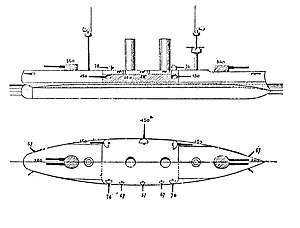Combat Fleets of the World
Flottes de combat is an almanac and a reference book of information of the world's warships arranged by nation, including information on ships' names, dimensions, armaments, silhouettes, photographs, etc.[1] It is published in French and English. Its editions cover the warships used by national naval and paramilitary forces, and provide data on their characteristics.
 Diagrams of Abdel Kadir from the 1904 edition | |
| Author | (in French) Bernard Prézelin (in English) Eric Wertheim |
|---|---|
| Country | France |
| Language | English / French |
| Genre | Maritime almanac |
| Publisher | Éditions maritimes & d’outre-mer, Ouest-France |
Publication date | From 1897 every two years |
Published in English | From 1977 |
| Pages | 1620 |
| ISBN | 978-1591149545 (in English) ISBN 2737350212 (in French) |
The original French edition was started by Commandant de Balincourt in 1897.[2] The current publisher is Éditions maritimes & d’outre-mer of Rennes, a subsidiary of Ouest-France. The English version, known as Combat Fleets of the World, has been published by Naval Institute Press in Annapolis (United States) since 1977. The latest English edition was the 16th edition in 2012. Both versions are published every two years.
Editors
French issue
| Start date | End | Name |
|---|---|---|
| 1897 | 1928 | Commandant de Balincourt |
| 1928 | 1943 | Commandant Vincent-Bréchignac |
| 1943 | 1974 | Henri Le Masson |
| 1974 | 1988 | Jean Labayle-Couhat |
| 1988 | Commandant Bernard Prézelin | |
English issue
| Start date | End | Name |
|---|---|---|
| 1977 | 2002 | A. D. Baker III |
| 2002 | Eric Wertheim |
Similar books
- Jane's Fighting Ships (United Kingdom)
- Brassey's Naval Annual (later Royal United Services Institute and Brassey's Defence Yearbook) : competing United Kingdom publication
- Almanacco Navale (Italy)
- Weyers Flottentaschenbuch (Germany)
References
External links
- (in French) Official web site for French edition (in French)
- (in French) Flottes de combat 1940-42, some extracts
- (in English) Combat Fleets of the World, 15th ed., some extracts
- All covers of French editions